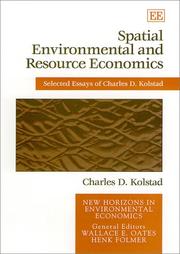| Listing 1 - 10 of 29 | << page >> |
Sort by
|

ISBN: 0195119541 9780195119541 Year: 2000 Publisher: New York : Oxford University Press,
Abstract | Keywords | Export | Availability | Bookmark
 Loading...
Loading...Choose an application
- Reference Manager
- EndNote
- RefWorks (Direct export to RefWorks)
Social costs. Social benefits --- Environmental protection. Environmental technology --- Environmental economics --- Environmental economics. --- 338.58 --- 628 --- 614.7 --- duurzame ontwikkeling --- economie, internationaal --- economische groei --- kosten-batenanalyse --- milieueconomie --- milieuproblematiek --- milieuvervuiling --- risk management --- Sociale lasten. Sociale baten --- Milieubescherming. Milieutechnologie --- Hygiene of air, water, soil. Pollution and its control --- Economics --- Environmental quality --- Environmental aspects --- Economic aspects
Book
ISBN: 9780195392555 0195392558 Year: 2009 Publisher: New York Oxford university press
Abstract | Keywords | Export | Availability | Bookmark
 Loading...
Loading...Choose an application
- Reference Manager
- EndNote
- RefWorks (Direct export to RefWorks)
Book
ISBN: 9780199732647 Year: 2011 Publisher: New York Oxford University Press
Abstract | Keywords | Export | Availability | Bookmark
 Loading...
Loading...Choose an application
- Reference Manager
- EndNote
- RefWorks (Direct export to RefWorks)
Book
Year: 2011 Publisher: Cambridge, Mass. National Bureau of Economic Research
Abstract | Keywords | Export | Availability | Bookmark
 Loading...
Loading...Choose an application
- Reference Manager
- EndNote
- RefWorks (Direct export to RefWorks)
Book
Year: 2010 Publisher: Cambridge, Mass. National Bureau of Economic Research
Abstract | Keywords | Export | Availability | Bookmark
 Loading...
Loading...Choose an application
- Reference Manager
- EndNote
- RefWorks (Direct export to RefWorks)
Book
Year: 2019 Publisher: National Bureau of Economic Research
Abstract | Keywords | Export | Availability | Bookmark
 Loading...
Loading...Choose an application
- Reference Manager
- EndNote
- RefWorks (Direct export to RefWorks)
Book
Year: 2014 Publisher: National Bureau of Economic Research
Abstract | Keywords | Export | Availability | Bookmark
 Loading...
Loading...Choose an application
- Reference Manager
- EndNote
- RefWorks (Direct export to RefWorks)

ISBN: 1840642300 Year: 2000 Publisher: Cheltenham Elgar
Abstract | Keywords | Export | Availability | Bookmark
 Loading...
Loading...Choose an application
- Reference Manager
- EndNote
- RefWorks (Direct export to RefWorks)
Digital
Year: 2010 Publisher: Cambridge, Mass. National Bureau of Economic Research
Abstract | Keywords | Export | Availability | Bookmark
 Loading...
Loading...Choose an application
- Reference Manager
- EndNote
- RefWorks (Direct export to RefWorks)
This paper develops a simple model of a polluting industry and an innovating firm. The polluting industry is faced with regulation and costly abatement. Regulation may be taxes or marketable permits. The innovating firm invests in R&D and develops technologies which reduce the cost of pollution abatement. The innovating firm can patent this innovation and use a licensing fee to generate revenue. In a world of certainty, the first best level of innovation and abatement can be supported by either a pollution tax or a marketable permit. However, the returns to the innovator from innovation are not the same under the two regimes. A marketable permit system allows the innovator to capture all of the gains to innovation; a tax system involves sharing the gains of innovation between the innovator and the polluting industry.
Digital
Year: 2011 Publisher: Cambridge, Mass. National Bureau of Economic Research
Abstract | Keywords | Export | Availability | Bookmark
 Loading...
Loading...Choose an application
- Reference Manager
- EndNote
- RefWorks (Direct export to RefWorks)
Why cooperation occurs when noncooperation appears to be individually rational has been an issue in economics for at least a half century. In the 1960's and 1970's the context was cooperation in the prisoner's dilemma game; in the 1980's concern shifted to voluntary provision of public goods; in the 1990's, the literature on coalition formation for public goods provision emerged, in the context of coalitions to provide transboundary pollution abatement. The problem is that theory suggests fairly low (even zero) levels of contributions to the public good and high levels of free riding. Experiments and empirical evidence suggests higher levels of cooperation. This is a major reason for the emergence in the 1990's and more recently of the literature on other-regarding preferences (also known as social preferences). Such preferences tend to involve higher levels of cooperation (though not always). This paper contributes to the literature on coalitions, public good provision and other-regarding preferences. For standard preferences, the marginal per capita return (MPCR) to investing in the public good must be greater than one for contributing to be individually rational. We find that Charness-Rabin preferences tend to reduce this threshold for individual contributions. We also find that Charness-Rabin preferences reduce the equilibrium size of a coalition of agents formed to provide the public good. In addition to theoretical results, some experimental implications of the theoretical model are provided. In contrast to much of the literature, we treat the wealth of agents as heterogeneous.
| Listing 1 - 10 of 29 | << page >> |
Sort by
|

 Search
Search Feedback
Feedback About
About Help
Help News
News